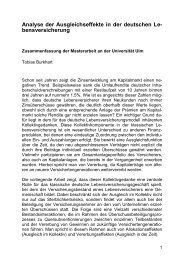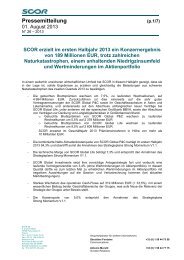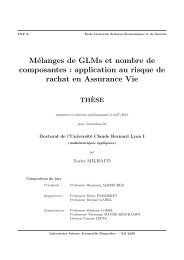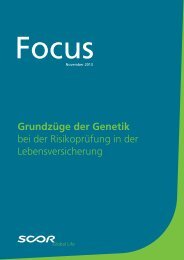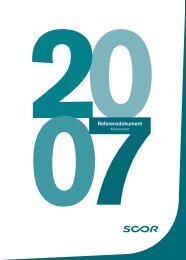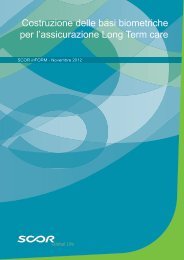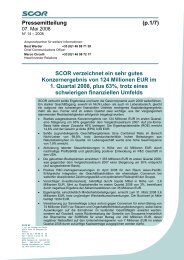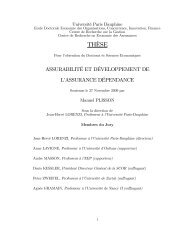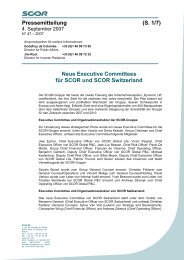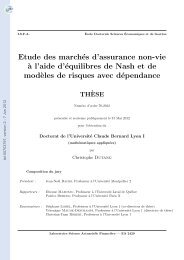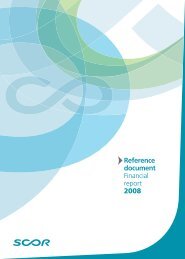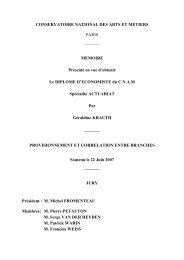4.4 Legal risk - Scor
4.4 Legal risk - Scor
4.4 Legal risk - Scor
Create successful ePaper yourself
Turn your PDF publications into a flip-book with our unique Google optimized e-Paper software.
F. Deposits with custodians<br />
As part of the management of its investment portfolio, SCOR deposits the securities it owns with a number of approved<br />
custodians. In the case of default of a custodian, depending on the local regulation applicable to the custodian, all or part<br />
of these securities could become blocked.<br />
The <strong>risk</strong> of losing all or part of securities the Group owns could have a material adverse impact on its business, present<br />
and future revenues, net income, cash flows, financial position, and potentially, on the price of its securities.<br />
G. Credit & Surety<br />
SCOR is exposed to credit <strong>risk</strong> through its Credit & Surety portfolio. By reinsuring the liabilities of its clients, which are<br />
insurers providing surety bonds and/or credit insurance policies, the Group must indemnify its ceding companies, for the<br />
portion that it reinsures, in the event of the default of companies on which its ceding companies are exposed.<br />
This business is situated in many countries, and across a diverse range of <strong>risk</strong>s, cedants and activity sectors.<br />
Multiple defaults of companies (or in the event of the default of a major company) on which the ceding companies are<br />
exposed could have a material adverse impact on SCOR’s business, present and future revenues, net income, cash<br />
flows, financial position, and potentially, on the price of its securities.<br />
H. Future profits of Life reinsurance treaties<br />
Credit <strong>risk</strong> on future profits from Life reinsurance policies arises from two <strong>risk</strong> factors.<br />
First of all, the payment of future profits expected under Life reinsurance contracts necessarily implies that the cedant is<br />
solvent: for this reason, SCOR <strong>risk</strong>s a reduction in the value of its portfolio of Life contracts in the event of a deterioration<br />
in the financial strength of the cedant. In such a case, it is possible that the VOBA and deferred acquisition costs (“DAC”)<br />
may as a consequence need to be written down and as a consequence, its shareholders’ equity would be reduced<br />
accordingly.<br />
In particular this affects the US book of business acquired in the course of the Transamerica Re acquisition. The majority<br />
of the former Transamerica Re's reinsurance contracts flow into SCOR via retrocession from Aegon companies. An<br />
AEGON insolvency might lead to premiums from clients no longer being passed on to SCOR, and thus potentially impair<br />
the value of business acquired (“VOBA”).Secondly, a reduction in the value of future profits could arise from a massive<br />
unexpected lapsation of policies following a deterioration of the cedant’s financial rating or an event which has a<br />
negative effect on SCOR’s image.<br />
The Group, therefore, has exposure to a credit <strong>risk</strong> linked to the insolvency and to the image of its cedants, which, if this<br />
were to occur, could have an adverse impact upon its business, present and future revenues, net income, cash flows,<br />
financial position, and potentially, on the price of its securities<br />
For further details on the impact of the assessment of intangible assets upon SCOR’s results, see “Section 4.2.5 – The<br />
valuation of SCOR’s intangible assets and deferred tax assets may significantly affect its shareholders’ equity and the<br />
price of its securities” and “Section 20.1.6 – Notes to the financial statements, Note 4 – Intangible Assets.”<br />
I. Default of pool members<br />
SCOR participates, for certain <strong>risk</strong> categories that are material (particularly terrorist <strong>risk</strong>s), in various groups of insurers<br />
and reinsurers (“pools”) aimed at pooling the relevant <strong>risk</strong>s among the members of each group. In the event of a total or<br />
partial default by one of the members of a group, it could be required to assume, in the event of joint liability of the<br />
members, all or part of the liabilities of the defaulting member. In such a case, its business, present and future revenues,<br />
net income, cash flows, financial position, and potentially, the price of its securities could be adversely impacted.<br />
For further details, refer to “Section 4.1.3 – SCOR could be subject to losses as a result of its exposure to terrorism.”<br />
J. Risk of accumulation of the above <strong>risk</strong>s<br />
The aforementioned <strong>risk</strong>s could accumulate in either a single counterparty, in the same sector of activity or the same<br />
country.<br />
See “Section 20 – Note 26, Insurance and financial <strong>risk</strong> – Credit <strong>risk</strong>” for further information on <strong>risk</strong> mitigation actions.<br />
4.1.15 SCOR IS EXPOSED TO THE RISK OF NO LONGER BEING ABLE TO RETROCEDE LIABILITIES ON<br />
ECONOMICALLY VIABLE TERMS AND CONDITIONS<br />
Some capacities SCOR offers are not achievable solely with its current available capital. These capacities (mainly<br />
catastrophic and large <strong>risk</strong>s) rely on retrocession whereby it purchases, mainly on a one-year basis, additional resources<br />
(retrocession) that allows the Group to provide capacity to its clients. SCOR tries to reduce its dependence vis-à-vis the<br />
traditional reinsurance market by entering into alternative <strong>risk</strong> transfer solutions (e.g. the multi-year securitization of<br />
catastrophic <strong>risk</strong> in the form of Insurance-Linked Securities ("ILS") and mortality swaps and the issuance of contingent<br />
capital securities). For more information on SCOR’s securitization of catastrophic <strong>risk</strong> and issuance of contingent capital<br />
securities, see “Section 6 – Business Overview, 6.1.4 Capital shield policy”. Nevertheless, SCOR is exposed to the <strong>risk</strong><br />
that it may not be able to retrocede liabilities on economically viable terms and conditions.<br />
32



